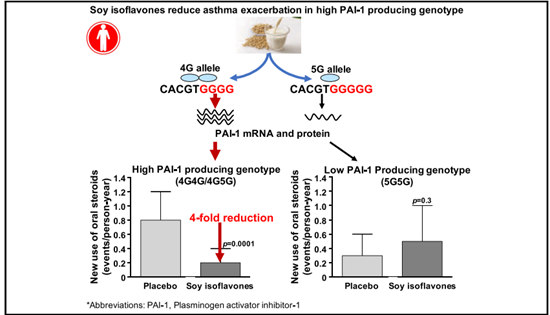Advantages:
- This research identified specific genetic markers (PAI-1 polymorphisms) linked to a significant reduction in asthma risk with soy isoflavone treatment.
- The research incorporates soy isoflavones into asthma management, leveraging the nutritional benefits of this natural compound and a holistic dietary path to respiratory wellness.
- The research marks a paradigm shift from generic treatments to a personalized approach, acknowledging the significance of individual genetic variations in determining asthma outcomes.
Summary:
Pediatric asthma affects up to 12% of U.S. children and accounts for 5.92 billion dollars of U.S. health care expenditure annually. Approximately 40% of the children who have wheezing episodes in early childhood will progress to have asthma, suggesting that primary prevention should target infancy. However, disease heterogeneity starts in early childhood, and there is a need for a precision medicine approach to prevention. In particular, severe early life viral lower respiratory tract infections show strong associations with asthma.
The 4G4G genotype of plasminogen activator inhibitor 1 (PAI-1) is associated with increased plasma PAI-1 levels and up to 18-fold increased asthma risk in children who have early life respiratory viral illnesses. Studies suggest that soy isoflavones can reduce PAI-1 levels. Our researchers have demonstrated that soy isoflavone treatment significantly reduced the number of severe asthma exacerbations in asthmatic patients with the high PAI-1–producing genotype. Soy intake seems to prevent the progression of allergic asthma. PAI-1 polymorphism is useful as a genetic biomarker for soy isoflavone intervention not only in asthmatic patients but also in children at risk of asthma and other allergic diseases.

Genistein reduces asthma exacerbations in high PAI-1 producing genotypes.
Desired Partnerships:
- License
- Sponsored Research
- Co-Development